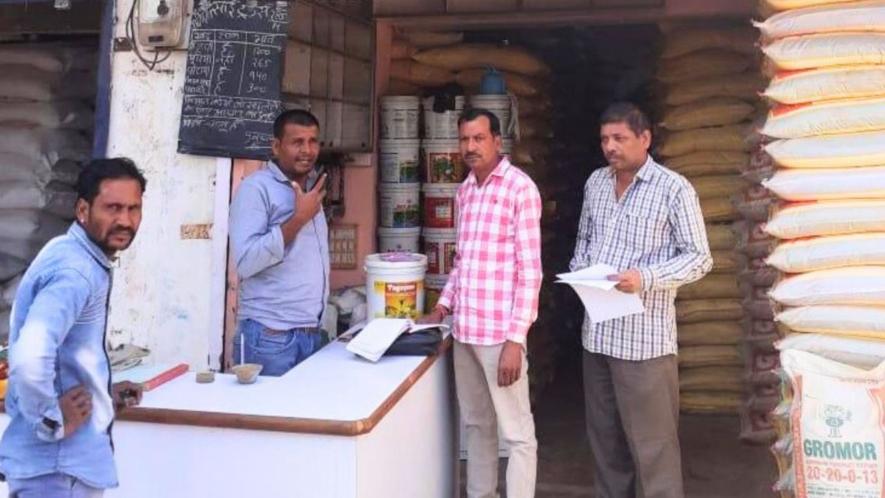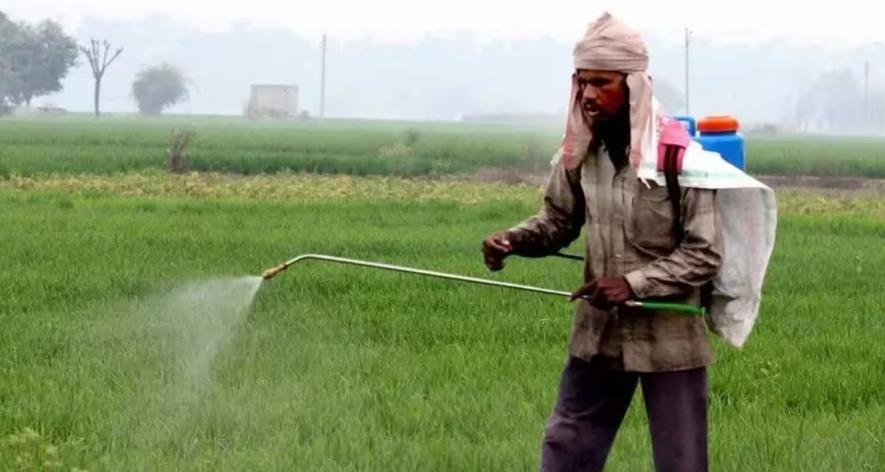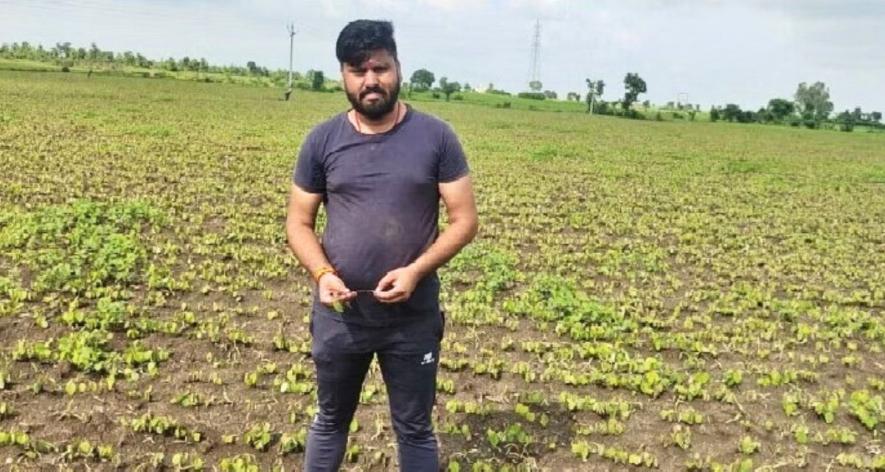MP: Consumer Forum, Insurance Scheme Not of Much Help to Farmers in Fake Agrochem Crisis

Investigation has been started against those selling fake pesticides in Bhopal district (Photo - Sanavver Shafi, 101Reporters).
Bhopal: Farmers in Madhya Pradesh have been losing their crops, hard work, and money to fake and substandard agrochemicals every season. But they do not manage to get compensation even if they have a bill regarding the purchase.
“To complain in the consumer forum, we will need a proper bill. But the dealers selling agrochemicals give us a piece of paper with only the amount written on it. Even if we lodge a complaint, our chances of winning are negligible as the bill is not in the prescribed format [without the address of the dealer, seal or date of purchase],” said Manoj Meena, whose 18-acre soybean cultivation at Rampura Balachon in Berasia tehsil of Bhopal district was ruined after use of insecticide that turned out to be spurious.
However, not many have managed to get relief through the consumer forum. Rashtriya Kisan Mazdoor Mahasangh national president Shivkumar Sharma said over 200 farmers in the Harda district lost soybean crops on a total of 5,000 acres after using chemicals bought from local retailer Harsh Agro in the kharif season of 2018. Of them, 30 came together to file a case against the local seller and agrochemical company Vision Organics in the District Consumer Forum. On May 9, 2019, the forum ordered Vision Organics to give compensation ranging from Rs 80,000 to 1.65 lakh, depending on the area of damage.
The government has authorised Reliance General Insurance to provide crop insurance under the Pradhan Mantri Fasal Bima Yojana (PMFBY) in the Bhopal district. Meena had also insured his kharif crop by paying Rs 7,260 to the company. However, he claimed that the insurance firm had complex rules, which prevented farmers like him from claiming compensation.
When asked about substandard agrochemicals-induced crop damage, Akash Parashar, Bhopal district officer of Reliance General Insurance, told 101Reporters that insurance claims can be made in such cases. "However, as per the rules, they can be compensated only if 80 to 90% of the farmers in a halka [an area comprising two to three villages] suffer crop loss. Furthermore, the crop damage survey reports of the tehsildar and those of the company should match. Only then will the claims of farmers be approved," he informed while reminding that the farmers have to deposit only 2% of the fixed premium rate in the kharif season and that the remaining amount is jointly given by the Central and state governments.
Meanwhile, farmers claimed that the Central and state governments always assure them that the insurance company will compensate for the loss of individual farmers as well. But the reality is that it does not happen on the ground. The chances of claims getting rejected are very high unless the locality or district is affected by the issue.
Taking this point forward, Munnalal Rajput of Rampura Balachon said the matter applied to all claim pleas. "If a farmer's crop is damaged in drought or flood or due to other reasons, then the insurance company says he cannot claim his compensation if not a majority of the farmers in that area suffered losses in that disaster. Even if the entire district was affected, the farmers cannot claim insurance until the administration declares drought.”
When this is the condition, even in the case of well-defined disasters such as drought, the farmers affected by spurious agrochemicals have the least scope of relief until and unless the government conducts a survey of the damage caused by counterfeit inputs and declares the district as affected.

Ram Gurjar spraying pesticide in the field (Photo - Sanavver Shafi, 101Reporters).
“While insuring the crop, farmers are given cover notes or slips. All the rules and regulations are explained to farmers before we take the insurance amount from them. If their crops get damaged due to a disaster or other reasons, then a notification will be issued by the district Collector. Only after that can they avail of the benefit. Farmers have to inform the district administration and insurance company within 72 hours of the loss assessment process. For this, toll-free numbers have been issued by both the company and the government,” he claimed.
Spotlight on awareness campaigns
Awareness programmes to educate farmers on spurious agricultural inputs are inadequate or are only on paper. Bharatiya Kisan Union’s Berasia tehsil president Devendra Singh Dangi said names of branded companies such as Bayer, Syngenta, Nagarjuna Fertilizers and Chemicals, Coromandel International Limited and Indian Potash Limited are used by fake manufacturers. “A factory inspection in Jabalpur on August 6 revealed that even cement, salt and marble ash were used to make spurious fertilisers,” he added.
BL Bilaiya, Joint director (in charge), of the agricultural department, told 101Reporters that the department has been raising awareness among farmers through phone calls, messages, mobile apps and camps. “This kharif season, 124 camps have been organised in villages.”
Citing the camp organised recently in Berasia tehsil, PS Goyal, Senior Agricultural Extension Officer, told 101Reporters that farmers were taught how to identify the agrochemicals available in the market. “They were also informed about the Government of India’s toll-free number 18001801551 to identify real and fake agrochemicals through call or message."
However, Shivkumar Sharma alleged that farmers get non-standard goods from government warehouses and vendors selling registered agricultural chemicals from different districts across the state.
“In the rabi season (November 2022 to April 2023), about 80 tonnes of NPK fertilisers that reached the government warehouses in Raisen district have been distributed to the farmers by the time the sample report that it was non-standard came. Farmers had to bear the brunt due to the sluggish attitude of officials. They do not take enough samples on time. Even if they do, the sample reports come very late. Many times, traders collude with the lab officials to get a favourable report,” Sharma detailed.
Deputy Secretary Tarun Bhatnagar acknowledged that farmers still complained that fertilisers and pesticides were not giving the intended results, even after getting a clean chit in the investigation report. To deal with this situation, an investigation committee was formed in February last year, and case studies from different districts were done, which laid bare the businessmen-lab operator nexus. The investigations were held in all 10 divisions of Madhya Pradesh.
“As a remedial measure, a new faceless method has been introduced, in which samples are sent to labs for testing using QR codes. We signed a memorandum of understanding with the postal department to make this possible. Neither the lab operator will know from which place the sample came nor the businessman will know to which lab the sample went,” Bhatnagar explained.
Proactive measures required
Replying to a starred question from Gohad (Bhind) MLA Mevaram Jatav in the state Assembly on March 24 last year, Farmer Welfare and Agriculture Development Minister Kamal Patel said that 35,116 fertiliser samples were taken for testing from marketing cooperative unions and primary agricultural credit societies in the preceding five years. Of them, 3,123 were found to be non-standard.
He informed the Assembly that there is a provision to return the money farmers spent on spurious agrochemicals through the Madhya Pradesh State Cooperative Marketing Federation (MP Markfed), provided the farmers submitted their claims. However, due to the non-submission of claims as prescribed by the Non-standard Fertiliser Fund, the amounts were not returned. The MP Markfed has deposited this money with the fund as per the rules.

Abhishek Pachauri, resident of Gram Bazaar village, said that soybean crop was sown in about 18 acres.
Patel said 10 FIRs have been registered in connection with the non-standard samples, while five cases have been filed in the court. Show cause notices have been issued in the remaining cases, and the sale of the remaining non-standard stock has been banned in accordance with the Fertilizer (Inorganic, Organic or Mixed) (Control) Order, 1985, he informed.
Raising doubts over the awareness camps, Bharatiya Kisan Sangh's provincial president, Kailash Singh Thakur, alleged that their implementation was not effective. "You can guess from the minister's answer in the Assembly what the status of awareness programmes is. If they were being held properly, the number of farmers filing for compensation would definitely have increased, but that is not happening. It simply means that either the camps are being conducted on paper or the correct information is not being conveyed to the farmers through these camps," he said.
As a result, fake agrochemical units take advantage of the illiteracy and lack of awareness of farmers to continue with their nefarious activities.
(Sanavver Shafi is a Madhya Pradesh-based freelance journalist and a member of 101Reporters, a pan-India network of grassroots reporters.)
Get the latest reports & analysis with people's perspective on Protests, movements & deep analytical videos, discussions of the current affairs in your Telegram app. Subscribe to NewsClick's Telegram channel & get Real-Time updates on stories, as they get published on our website.
























